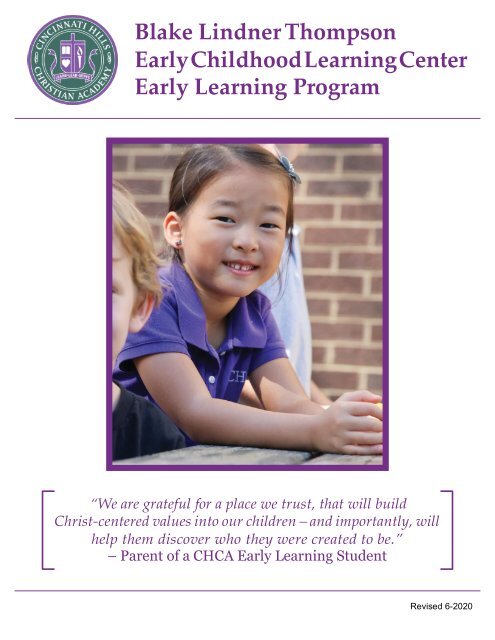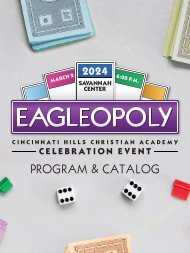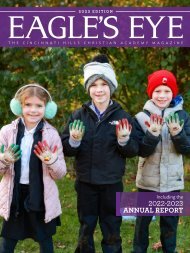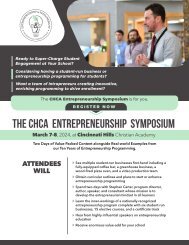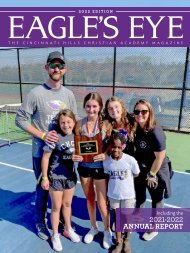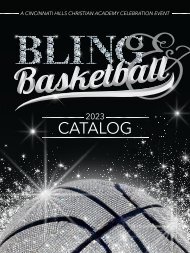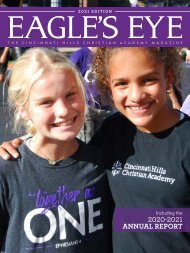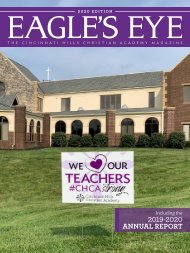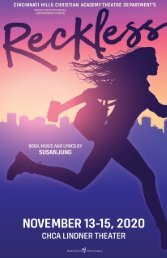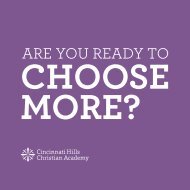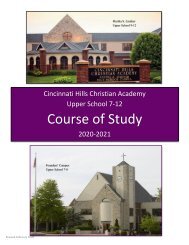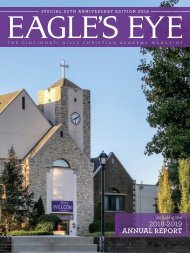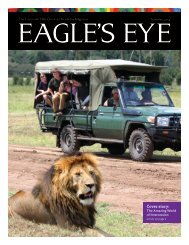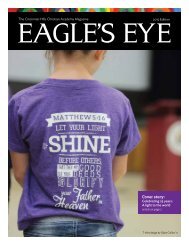Blake Lindner Thompson Early Childhood Learning Center Early Learning Program
Cincinnati Hills Christian Academy-Blake Lindner Thompson Early Childhood Learning Center Early Learning Program
Cincinnati Hills Christian Academy-Blake Lindner Thompson
Early Childhood Learning Center Early Learning Program
Create successful ePaper yourself
Turn your PDF publications into a flip-book with our unique Google optimized e-Paper software.
<strong>Blake</strong> <strong>Lindner</strong> <strong>Thompson</strong><br />
<strong>Early</strong> <strong>Childhood</strong> <strong>Learning</strong> <strong>Center</strong><br />
<strong>Early</strong> <strong>Learning</strong> <strong>Program</strong><br />
“We are grateful for a place we trust, that will build<br />
Christ-centered values into our children – and importantly, will<br />
help them discover who they were created to be.”<br />
– Parent of a CHCA <strong>Early</strong> <strong>Learning</strong> Student<br />
Revised 6-2020
Cincinnati Hills Christian Academy<br />
11312 Snider Road, Cincinnati, OH 45249 • 513-247-0900 • chca-oh.org<br />
Revised 6-2020
Cincinnati Hills Christian Academy<br />
<strong>Early</strong> <strong>Learning</strong> <strong>Program</strong> Statement<br />
Vision<br />
Cincinnati Hills Christian Academy will unleash each student’s God-given gifts through Christ-centered<br />
academic excellence. We are devoted to developing the whole person, and instilling a lifelong passion for<br />
learning, leading and serving.<br />
Mission<br />
Cincinnati Hills Christian Academy is a Christ-centered, Non-denominational, College Preparatory<br />
Academy that exists to:<br />
Prepare students intellectually and spiritually for success in higher education and to impact and influence<br />
the world according to their unique gifts and talents. This will be accomplished by:<br />
1. Creating an environment that encourages<br />
students, faculty, staff, and families to develop<br />
and live out their relationship with Jesus Christ.<br />
2. Developing a passion for lifelong learning that<br />
leads to thoughtful, effective service through<br />
excellent, intentional curriculum and extracurricular<br />
offerings.<br />
“I will instruct you and<br />
teach you in the way you<br />
should go; I will counsel<br />
you with my eye upon you.”<br />
Psalm 32:8<br />
3. Empowering outstanding Christian faculty and staff to fully use their passions and expertise to<br />
create engaged critical thinkers.<br />
4. Fostering an exceptional environment that develops students’ gifts and talents in the arts,<br />
athletics, leadership, and additional extra-curricular opportunities for God’s purposes.<br />
5. Building an engaged school community – encompassing faculty, staff, students, families, alumni,<br />
and donors – that reinforces the school’s vision, mission, and core values.<br />
“He said to them, ‘Let the little children come to me, and do not<br />
hinder them, for the kingdom of God belongs to such as these.’”<br />
Mark 10:14<br />
2
Cincinnati Hills Christian Academy<br />
<strong>Early</strong> <strong>Learning</strong> <strong>Program</strong> Statement<br />
Core Values<br />
1. Christ-<strong>Center</strong>edness: We believe in following how Christ Himself led, served, taught, loved, and<br />
lived; we strive to base all we do on His word.<br />
2. Academic Excellence: We believe in reflecting we are an academy of learning. It is our primary,<br />
but not exclusive, goal to prepare our students academically for college and beyond.<br />
3. Whole Person: We believe in recognizing all are gifted by God in unique ways. We believe in<br />
developing all forms of spiritual, intellectual, artistic, athletic gifts in each student to their fullest<br />
potential.<br />
4. Servant Leadership: We believe in the power of servanthood. Servant leadership will be taught,<br />
modeled, and encouraged to all students, staff, and parents so that all are equipped for the<br />
situations in life when God calls them to lead.<br />
5. Outreach/Service: We believe in modeling Christ in all we do. We will provide opportunities daily<br />
and through special events for students, staff, and parents to share Christ’s love through service<br />
and witness to others.<br />
6. Stewardship: We believe in acknowledging we are blessed in many ways. We as a school will<br />
model strong fiscal stewardship and will encourage, train, and expect students, staff, and parents<br />
to be wise and generous stewards over their time, talents, and money.<br />
7. The Value of Each Person: We believe in demonstrating biblical equality, embracing each<br />
individual as a unique creation of God, ensuring we operate in an emotionally, socially, and<br />
physically safe and nurturing environment, and intentionally enrolling a student body, faculty and<br />
staff who reflect the socioeconomic and racial make-up of the community in which we live.<br />
8. Vibrant Sense of Community: We believe in acting intentionally. We will foster a vibrant,<br />
connected culture of empathy, fellowship, and respect among students, staff, and parents.<br />
9. Accountability: We believe in holding ourselves and each other to the highest standards of<br />
integrity, excellence, and constant measureable improvement.<br />
10. A Joyful Spirit: We believe in having an attitude of gratitude for God’s blessings that are lived out<br />
in every day smiles, laughter, and by celebrating demonstrated character and unique<br />
achievements. This results in a contagious joy that connects at the heart-level.<br />
3
Cincinnati Hills Christian Academy<br />
<strong>Blake</strong> <strong>Lindner</strong> <strong>Thompson</strong> <strong>Early</strong> <strong>Childhood</strong> <strong>Learning</strong> <strong>Center</strong><br />
<strong>Early</strong> <strong>Learning</strong> <strong>Program</strong><br />
Purpose of the <strong>Early</strong> <strong>Learning</strong> <strong>Program</strong><br />
CHCA’s <strong>Blake</strong> <strong>Lindner</strong> <strong>Thompson</strong> <strong>Early</strong> <strong>Childhood</strong> <strong>Learning</strong> <strong>Center</strong> offers high quality Toddler and<br />
Preschool <strong>Program</strong>s to our school community for children ages 2-5. The purpose is to provide CHCA’s<br />
youngest students with a safe, nurturing, and stimulating introduction to school life. The programs are<br />
designed to instill a love of learning in each child by meeting each student’s cognitive, social, emotional,<br />
physical, creative, and spiritual needs, providing an excellent foundation for the formal learning experiences<br />
that lie ahead.<br />
CHCA respects parents as the primary and most important providers of care, nurturing, and education for<br />
their children. “Raise up a child in the way he should go and when he is old he will not depart from it.” Proverbs<br />
22:6. The programs provide opportunities for parents and teachers to develop strong partnerships that will<br />
positively impact each child’s care and education.<br />
The programs are predicated on the belief that when children are engaged cognitively, relationally, and<br />
spiritually, learning is maximized. CHCA creates learning experiences that invite students to construct<br />
knowledge and make meaning of their world. Students construct their knowledge through movement,<br />
exploration, use of a variety of materials, collaboration with others, and opportunities to make connections<br />
to something they already know. CHCA’s vibrant and engaging environment acknowledges that<br />
foundational to learning, are the experiences and knowledge that children bring to school in combination<br />
with their natural senses of curiosity and wonder, and joyful exuberance.<br />
The curriculum provides age-appropriate, high quality academics based on standards derived from current<br />
research on brain-based learning and the State of Ohio <strong>Early</strong> <strong>Learning</strong> Content Standards in all content<br />
areas. And all content areas are integrated with a Christian worldview.<br />
<strong>Early</strong> <strong>Learning</strong> <strong>Program</strong> Philosophy<br />
The philosophy of the <strong>Early</strong> <strong>Learning</strong> <strong>Program</strong> is grounded in the belief that “Children are a gift from the Lord;<br />
they are a real blessing.” Psalm 127:3. As a school community, we join you as parents in embracing your child<br />
as His gift with joy and thanks. And we partner together, guiding and nurturing your child to flourish, and<br />
realize his or her God-given potential.<br />
CHCA’s <strong>Early</strong> <strong>Learning</strong> <strong>Program</strong> values the whole child and acknowledges each child as having unique<br />
experiences, interests, and cultural values that must be recognized and respected. We believe all<br />
children have an innate curiosity and interest in engaging in social interactions, establishing relationships,<br />
constructing meaning, and negotiating their environment.<br />
4
Cincinnati Hills Christian Academy<br />
<strong>Blake</strong> <strong>Lindner</strong> <strong>Thompson</strong> <strong>Early</strong> <strong>Childhood</strong> <strong>Learning</strong> <strong>Center</strong><br />
<strong>Early</strong> <strong>Learning</strong> <strong>Program</strong><br />
“The principal goal of<br />
education in the schools<br />
should be creating men and<br />
women who are capable<br />
of doing new things, not<br />
simply repeating what other<br />
generations have done.”<br />
– Jean Piaget<br />
Inspired by the Reggio-Emilia philosophy, CHCA’s inquiry-based early learning curriculum provides<br />
meaningful, engaged, effective learning. It is well planned and organized with instructional strategies<br />
to support, challenge, make connections to experiences and previous learning, and extend each child’s<br />
abilities and skills. The curriculum is rich with opportunities to solve problems, develop literacy, use<br />
critical thinking, collaborate, and engage in intellectual activities. Teachers guide the children to construct<br />
knowledge through a hands-on, discovery learning process that emerges from the interests of the students,<br />
tailoring the provocations and investigations to ensure learning benchmarks are met.<br />
Students of CHCA’s <strong>Early</strong> <strong>Learning</strong> <strong>Program</strong> will choose from a wide range of opportunities and experiences<br />
including:<br />
• Interactions with other children and with loving, Christ-centered teachers<br />
• Explorations with manipulatives and problems to solve<br />
• Creative dramatics, music, and art in the Atelier<br />
• Large and fine motor development<br />
• Natural experiences in the Nature <strong>Learning</strong> Lab<br />
The program provides a thoughtful balance of child-led and teacher-framed activities and experiences to<br />
help students develop a positive self-image and offers opportunities for individual and group work and play.<br />
CHCA’s objective is to help children realize their potential while meeting their developmental needs.<br />
5
Cincinnati Hills Christian Academy<br />
<strong>Blake</strong> <strong>Lindner</strong> <strong>Thompson</strong> <strong>Early</strong> <strong>Childhood</strong> <strong>Learning</strong> <strong>Center</strong><br />
<strong>Early</strong> <strong>Learning</strong> <strong>Program</strong><br />
<strong>Early</strong> <strong>Learning</strong> <strong>Program</strong> Description<br />
The Two, Three and Four-Year-Old programming offers a wonderful beginning and foundation to a child’s<br />
education. Children are provided developmentally tailored opportunities to expand their learning and<br />
develop the underlying skills to prepare for a smooth transition on to the next academic year. Children must<br />
be two, three, or four years old by September 30 in order to be considered for placement into each program.<br />
The classrooms contain a rich variety of materials and resources for students to experience:<br />
• Finest children’s literature<br />
• Creative, natural, and manipulative materials<br />
• Language through day to day conversations,<br />
books, poetry, creative dramatics and writing<br />
• Variety of music and art activities<br />
• Quiet and active playtime<br />
• Engagement <strong>Center</strong>s<br />
• Large group, small group, and individual<br />
instruction<br />
• The Atelier, a studio for creativity<br />
and innovation<br />
• Nature <strong>Learning</strong> Lab<br />
• Indoor recreational space and outdoor<br />
natural playscape<br />
<strong>Early</strong> <strong>Learning</strong> <strong>Program</strong> Curriculum<br />
The curriculum presents a continuum of learning and development in the following domains:<br />
Christian Studies: We are made in God’s image and children are valued as children of God, receiving<br />
instruction in the Bible at age appropriate levels through stories and activities. God is the creator of the<br />
world we live in, and wonder and appreciation for His creation are responses to the world around us. Our<br />
relationships with others follow biblical principles of the Golden Rule and of community. Bible stories provide<br />
examples of biblical heroes, and students learn the importance of developing godly character. Students<br />
practice prayer as a simple conversation with God.<br />
Language and Literacy: Teachers model and invite students into the love of language and its many<br />
expressions: oral, written, dramatic, and musical play. During the toddler years children acquire concepts<br />
such as conventions of print, develop phonological awareness by hearing stories, rhymes, playing games and<br />
in interaction with adults who model and value language and value children. Children learn to listen to and<br />
talk about books that are read to them, construct understanding about books, develop concepts of print and<br />
the idea of story. Vocabularies grow and children acquire new words through literature, hands on, sensorial<br />
experiences, explorations, and investigations. The environment is literacy rich.<br />
Mathematics: Young children’s knowledge of mathematics is constructed over time where mathematics<br />
experiences are woven throughout the curriculum, follow logical sequences, allow for depth and focus and<br />
6
Cincinnati Hills Christian Academy<br />
<strong>Blake</strong> <strong>Lindner</strong> <strong>Thompson</strong> <strong>Early</strong> <strong>Childhood</strong> <strong>Learning</strong> <strong>Center</strong><br />
<strong>Early</strong> <strong>Learning</strong> <strong>Program</strong><br />
connect to the child’s development of knowledge and skills. Carefully planned experiences focus attention<br />
on particular mathematical concepts. Instruction includes: number sense and counting, ideas of groupings<br />
and comparisons, patterning and ordering, sequences, measurement, and geometry and spatial relationships.<br />
Instruction is grounded in manipulatives, provocations and loose parts, problem solving, collaborative work,<br />
and ties to language.<br />
Science: Science instruction is founded upon the design of its Creator and students are introduced to<br />
God’s creation at the earliest level. Students are natural scientists: curious, observing, and questioning. The<br />
science curriculum provides a balance among science inquiry, earth and space science, physical science, and<br />
life science where students explore ideas, manipulate materials, and engage in conversations to construct<br />
understanding. Students share with others their experiences and expand their understanding of the natural<br />
world through observing, exploring, drawing, and construction. Exploration of science-related topics is<br />
enhanced by lessons from the Science Innovation Lab brought to the classroom and visits to the Nature<br />
<strong>Learning</strong> Lab.<br />
Social Studies: Students begin to acquire an awareness and understanding of the world, starting with God<br />
who created them. Children explore how people live, work, get along with others, solve problems, and<br />
shape their surroundings. For young children, the family, school, neighborhood, and community are ways to<br />
experience social studies in action. Everyday experiences in the learning community support development of<br />
self and competence along with building relationships, healthy peer interactions, and empathy.<br />
Approaches to <strong>Learning</strong>: In addition to core curricular content, the program intentionally creates the learning<br />
environment and experiences necessary to build skills in productive behaviors, dispositions, and attitudes<br />
which have been shown to enhance learning, specifically: initiative, engagement, persistence, and creativity.<br />
Physical Well Being and Motor Development: Healthy skills and behaviors help set children on a path<br />
to more effective learning and living a healthy lifestyle. In both individual and cooperative learning<br />
environments throughout the school day, students will have opportunities to develop both fine and large<br />
motor skills. In addition, healthy habits and practices are emphasized so that they become part of the<br />
children’s daily routine.<br />
Social and Emotional Development: Positive social and emotional development provides an essential<br />
foundation for cognitive and academic competence not only in preschool but in later years as well. Each<br />
aspect of the day will allow for the development of the skills, attitudes, and values necessary for students to<br />
successfully navigate their world through interactions with adults and peers.<br />
7
Cincinnati Hills Christian Academy<br />
<strong>Blake</strong> <strong>Lindner</strong> <strong>Thompson</strong> <strong>Early</strong> <strong>Childhood</strong> <strong>Learning</strong> <strong>Center</strong><br />
<strong>Early</strong> <strong>Learning</strong> <strong>Program</strong><br />
“…play is the principal<br />
business of childhood.”<br />
– Jerome S. Bruner<br />
Classroom Practices<br />
Our classroom practices are designed to<br />
create an engaging, safe, stimulating, and<br />
challenging environment in which each<br />
child is encouraged to grow and learn.<br />
Morning Meetings: We gather as a whole class to<br />
share news, pray and give prayer requests, and<br />
introduce content, skills, and expectations for the<br />
morning’s activities.<br />
Interactive Modeling: We teach children to notice<br />
and internalize expected behaviors through<br />
modeling.<br />
Logical Consequences: We respond to behavior<br />
that allows children to fix and learn from mistakes<br />
while preserving their dignity.<br />
Academic Choice: We increase student motivation<br />
and engagement by differentiating instruction and<br />
allowing students choices in their work.<br />
Working with Families: We build a community<br />
of support and enrichment through family<br />
engagement and partnership with teachers.<br />
Rule Creation: We help students create and<br />
understand classroom rules that allow all class<br />
members to meet their learning needs.<br />
Positive Teacher Language: We use words and tone<br />
to promote children’s active learning and selfdiscipline.<br />
Guided Discovery: We introduce materials in<br />
a way that encourages creativity, persistence,<br />
investigation, inquiry, and engagement.<br />
Classroom Organization: We set up the learning<br />
environment in ways that encourage independence,<br />
cooperation, productivity and engagement.<br />
Collaborative Problem Solving: We use<br />
conferencing, role playing, and other strategies to<br />
resolve any student conflicts within the classroom.<br />
8
Cincinnati Hills Christian Academy<br />
<strong>Blake</strong> <strong>Lindner</strong> <strong>Thompson</strong> <strong>Early</strong> <strong>Childhood</strong> <strong>Learning</strong> <strong>Center</strong><br />
<strong>Early</strong> <strong>Learning</strong> <strong>Program</strong><br />
Sample Daily Schedule<br />
The following represents a sample sequence of daily instructional activities. Times are approximate and the order<br />
of activities may vary as yearly schedules are created. Each activity is welcoming and affirming to each child and<br />
is intended to engage the student’s interest on cognitive, emotional, social, spiritual, and physical levels.<br />
8:20-8:30 a.m. – Arrival: Children arrive to the<br />
classroom and sign in (folder work).<br />
8:40-9:00 a.m. – Group Meetings: Introduction to<br />
isolated skills and concepts, shared story, calendar<br />
item and morning message. (Individual Classrooms)<br />
9:00 -11:00 a.m. – Engagement <strong>Center</strong>s, Project<br />
Work and Enrichment Classes*: Children will<br />
participate in and put into practice the skills<br />
and academic concepts introduced formally by<br />
the teacher during group meeting. The various<br />
engagement centers offer students many<br />
opportunities which relate to the current topic<br />
in the project-based learning approach, as well<br />
as fine arts (music, visual arts, theater/drama),<br />
writing /literacy, sensory, nature and science, math,<br />
tinkering, snack, Christian studies, construction<br />
and creative time in The Atelier. (Classrooms, The<br />
Atelier, Outdoor <strong>Learning</strong> Lab, Atrium)<br />
1:30-1:45 p.m. – Transition from nap (toileting, nap<br />
items put away etc…) to preparing for enrichment<br />
classes.<br />
1:45-2:45 p.m. – Enrichment Classes and Free<br />
Exploration of Engagement <strong>Center</strong>s. (Atrium, The<br />
Atelier, and Library).<br />
2:45-3:00 p.m. – Snack, Story, Prayer and Good-bye<br />
3:00-6:00 p.m. – Extended Day program begins,<br />
including enrichment classes and free exploration<br />
of Engagement <strong>Center</strong>s.<br />
*Chapel occurs weekly (day, time TBD)<br />
11:00-11:30 a.m. – Outdoor <strong>Learning</strong> Lab or Indoor<br />
Recreational Activity (Outdoor <strong>Learning</strong> Lab or<br />
Atrium).<br />
11:30 a.m. -12:30 p.m. – Lunch and Nap transition:<br />
Children may pack or purchase a lunch. Following<br />
lunch (12:00 p.m.), students enrolled in the half day<br />
program are dismissed. (Atrium and Classroom)<br />
12:30-1:30 p.m. – Naptime: Children rest or sleep on<br />
cots during this time. (Classroom)<br />
9
Cincinnati Hills Christian Academy<br />
<strong>Blake</strong> <strong>Lindner</strong> <strong>Thompson</strong> <strong>Early</strong> <strong>Childhood</strong> <strong>Learning</strong> <strong>Center</strong><br />
<strong>Early</strong> <strong>Learning</strong> <strong>Program</strong><br />
Enrichment Classes (Offered weekly; days and times vary by class)<br />
Music: Children explore sound through singing, moving, listening, and playing rhythm instruments.<br />
Spanish: Once per week, students will begin to learn and appreciate the Spanish Language and Hispanic<br />
culture, using everyday naming vocabulary, games, greetings and songs. Children use play to explore the joy<br />
of seeing God’s world through another language and culture.<br />
Art: Each morning, students will enjoy creative time in The Atelier. Art and various mediums are provided<br />
for students to express their understandings, to grow in fine motor skills, extend the learning in the<br />
classrooms, innovate, and to develop an awareness of the world around them. Students learn the use of<br />
and care of materials and tools and practice in various media, techniques and processes related to the<br />
visual arts.<br />
Library: Students enjoy literacy rich opportunities during story time, once each week in the library. Students<br />
will hear and participate in stories and research related to current project work.<br />
Science Explorers: “Ever since the creation of the world His invisible nature, namely, His eternal power and deity,<br />
has been clearly perceived in the things that have been made.” Romans 1:19-20. Students have opportunities<br />
in The Atelier and outdoor learning lab to explore, experiment, hypothesize, question and develop science<br />
concepts with our Science Enrichment Teacher.<br />
Adventures in Movement: By tapping into a child’s natural curiosity and encouraging them to<br />
explore movement through guided play and discovery, we develop fundamental movement skills.<br />
Engagement <strong>Center</strong>s<br />
Engagement centers allow the students to work independently in designated areas and offer students<br />
access to natural materials in a hands-on and manipulative environment. Materials in each center support<br />
an extension of formally introduced skills and concepts during the morning meeting. Materials in each<br />
center change regularly to support concept, knowledge building, and engagement. The engagement<br />
center learning and development illuminates the breadth of learning and development from age 2 to 5 that<br />
strengthens the child’s school readiness for entry into kindergarten.<br />
Construction <strong>Center</strong>: Children design and create structures as they experiment with size, shape<br />
and weight. The children are encouraged to use the materials in the block and construction area in<br />
unconventional ways using a variety of offered materials.<br />
10
Cincinnati Hills Christian Academy<br />
<strong>Blake</strong> <strong>Lindner</strong> <strong>Thompson</strong> <strong>Early</strong> <strong>Childhood</strong> <strong>Learning</strong> <strong>Center</strong><br />
<strong>Early</strong> <strong>Learning</strong> <strong>Program</strong><br />
Fine Arts (Music, Visual Arts and Dramatic Play) <strong>Center</strong>: Children are introduced to a variety of<br />
instruments to discover how they make sounds and are exposed to various music genres in music<br />
appreciation. Children will be able to express creativity, observe cause and effect with a variety of mediums,<br />
increase small motor development, learn colors, shapes and textures, and develop aesthetic appreciation<br />
and independent work skills. Children will also develop creative expression, imagination, social interaction<br />
skills and work through problems by reenacting real life experiences.<br />
Writing and Literacy: <strong>Early</strong> literacy skills include developing concepts of print, comprehension of ageappropriate<br />
text, phonological awareness, and letter recognition. Children will develop reading and writing<br />
readiness skills as they practice letter formation and recognition, storytelling, growing their vocabulary, and<br />
expressing themselves through language and messaging.<br />
Sensory <strong>Center</strong>: Children develop sensory awareness with materials such as sand, water, rice etc… They<br />
compare characteristics by sifting, pouring, comparing, and experimenting with materials.<br />
Nature and Science <strong>Center</strong>: Focuses on children’s curiosity to explore and learn about their environment.<br />
It includes behaviors of exploration and discovery and the conceptual development of problem solving and<br />
cause and effect. Children can explore, experiment, observe, hypothesize, question and develop concepts<br />
using real objects.<br />
Math <strong>Center</strong>: Children develop an understanding of number quantity, number relationships, basic algebraic<br />
concepts, measurement and data and geometry through hands on games, activities and materials. The<br />
math center also addresses children’s developing knowledge of key attributes of objects, including size and<br />
shape, and the way objects fit, are positioned, and move in space.<br />
Tinkering <strong>Center</strong>: Initiative, creativity, curiosity, and their motivation to participate in new and varied<br />
innovative experiences and challenges occur in this inventing center. Children’s creative, innovative thinking<br />
allows them to think about or use materials in unconventional ways, and to express thoughts and ideas with<br />
a variety of recycled and repurposed materials. Engagement, persistence and initiative are fostered in this<br />
center.<br />
Christian Studies <strong>Center</strong>: Emphasizes Christ’s love for each child/person. Christ-like character traits are<br />
nurtured and developed through songs and literature. Bible concepts, principles and stories are integrated<br />
with hands on materials, activities and literature.<br />
11
<strong>Blake</strong> <strong>Lindner</strong> <strong>Thompson</strong> <strong>Early</strong> <strong>Childhood</strong> <strong>Learning</strong> <strong>Center</strong><br />
<strong>Early</strong> <strong>Learning</strong> <strong>Program</strong><br />
Cincinnati Hills Christian Academy<br />
11312 Snider Road, Cincinnati, OH 45249 • 513-247-0900 • chca-oh.org


